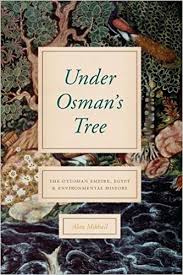Alan Mikhail awarded M. Fuat Köprülü Book Prize of the Ottoman and Turkish Studies Association
Alan Mikhail, Professor of History, has been awarded the M. Fuat Köprülü Book Prize of the Ottoman and Turkish Studies Association for his book, Under Osman’s Tree: The Ottoman Empire, Egypt, and Environmental History. The prize is awarded to “the most outstanding book in the field of Ottoman and Turkish studies published in the previous year.”
According to the association’s citation, “Under Osman’s Tree is an outstanding book that offers an imaginative and original approach to the study of the Ottoman Empire from the perspective of environmental history. Focusing on Ottoman Egypt but conceptualizing the empire as a whole as an integrated ecosystem, it shows the profound effects of the natural environment on politics, state-society relations, and socio-economic  transformations. In this complex world of the natural environment and its equally complex system of resource management, Mikhail takes as his guide the environment itself, and thus provides an unprecedented interpretation of Ottoman history by foregrounding the crucial roles played by disease, climate, natural resources, and animals. Calling attention to the interconnectedness and mutually transformative relations between different parts of the empire as well as the centrality of the Middle East to the global environment, the book also illustrates how local communities, such as peasants and farmers, had agency in influencing decisions made at the state’s center. It thus challenges some of the basic assumptions about Ottoman history and compellingly fleshes out the interconnectedness—human and otherwise—of an early modern empire. The book’s narrative masterfully switches between different scales of analysis to identify critical points of transformation, decision making, and the invisible actors of the empire’s history. Moreover, it works as a roadmap for future research; both in-depth studies relating to Egypt and other comparisons drawn suggest further novel research trajectories. This study makes a significant contribution not only to Ottoman and Middle Eastern history but also to the burgeoning field of environmental studies more generally. As such, it makes for a fascinating read for scholars and students of the Ottoman Empire, the broader Middle East and North Africa, and well beyond. Representing the culmination of the author’s substantial and pathbreaking body of research to date, Under Osman’s Tree is the best book on Ottoman environmental-cum-imperial history yet written.”
transformations. In this complex world of the natural environment and its equally complex system of resource management, Mikhail takes as his guide the environment itself, and thus provides an unprecedented interpretation of Ottoman history by foregrounding the crucial roles played by disease, climate, natural resources, and animals. Calling attention to the interconnectedness and mutually transformative relations between different parts of the empire as well as the centrality of the Middle East to the global environment, the book also illustrates how local communities, such as peasants and farmers, had agency in influencing decisions made at the state’s center. It thus challenges some of the basic assumptions about Ottoman history and compellingly fleshes out the interconnectedness—human and otherwise—of an early modern empire. The book’s narrative masterfully switches between different scales of analysis to identify critical points of transformation, decision making, and the invisible actors of the empire’s history. Moreover, it works as a roadmap for future research; both in-depth studies relating to Egypt and other comparisons drawn suggest further novel research trajectories. This study makes a significant contribution not only to Ottoman and Middle Eastern history but also to the burgeoning field of environmental studies more generally. As such, it makes for a fascinating read for scholars and students of the Ottoman Empire, the broader Middle East and North Africa, and well beyond. Representing the culmination of the author’s substantial and pathbreaking body of research to date, Under Osman’s Tree is the best book on Ottoman environmental-cum-imperial history yet written.”